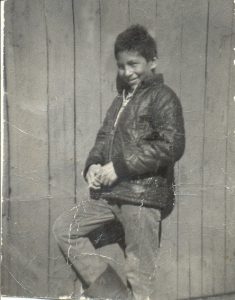Hello Classmates,
I am quite sorry for the late start I have had to the semester, I am working through the joys of being a new Father. That’s right, my son Hayden was born on October 17th and my wife and I could not be happier. Going into parenthood we knew that our lives would change dramatically, and to say the least we have been quite busy! I am a “mature” student, as I just celebrated my 32nd birthday on December 26, and I am excited to say that I will be graduating in May with a Bachelor of Arts, majoring in history with a minor in English. The next step from here will be to apply to my graduate school of choice and obtain a graduate degree in business.
I am not an expert on the subject matter that we will encounter in our course, however, I have taken one course (ENGL 231: Introduction to Indigenous Literatures) which focused a great deal on Indigenous literature in Canada. Also, I have taken a couple courses that deal with the history of Canada. I’m looking forward to ENGL 470, as this course should expand my knowledge of the history of my country.
English 470 will allow students to read, understand, and sometimes reinterpret the stories that have been told over the years from first “contact” and how these stories have been told, whose voice is being projected, and whose voice is being ignored. Throughout history many stories that have been popularized are often told through a Eurocentric viewpoint. Colonialism resulted in devastation for the indigenous peoples of North America, as a result many of the stories that have been told over time do not properly represent the voices of the past. In a kind of “silencing” of the past, story telling over time sometimes fails to paint a true representation of the past. From these stories emerges an identity that Canadians find themselves living by. It is important to question the accuracy of these stories, and see if the representation of specific times or events are true, and if they are not true then we must ask ourselves how we can see them differently, not only to better represent the history of this land, but also to better understand ourselves and our identity as Canadians.
I mentioned “silencing of the past”, which is a term I first heard in an African-American Studies course I took, and it can also be applied to the history of Canada and the Indigenous people that lived here since before European contact. A fantastic read by author Michel-Rolph Trouillot, “Silencing the Past: Power and the Production of History” (http://hdl.handle.net/2027/heb.04595), describes how history is often recorded and retold in a way that favours the one writing it. In North America, unfortunately, the voices of the past have often been recorded through a white/ European lens, which does not properly represent all those involved throughout history. Arguably, due to the racism and mistreatment of certain groups of people over time, the world we live in today has been shaped by the stories we hear, which has prevented us from truly understanding our past, shaping us into who we are today. Asking harder questions about the stories we hear and read, and challenging ourselves to see these stories through a different lens is what I am excited for in English 470.
I am new to hperlinking, and blogging in general, but I want to share one more link with all of you. Some of you may have heard of the band The Tragically Hip, and their lead singer Gord Downie. Downie, an Canadian legend, died from a brain tumor a couple of years ago, however, his work within Indigenous communities within Canada is nothing sort of amazing. He challenged Canadians to not ignore the racist past of Canada, and that we need to look to better the conditions this country has provided for Indigenous peoples all over, but more specifically those living up North. Downie believed that, “[Past] [g]enerations grew up not hearing about what’s happening in the North and in Indigenous communities everywhere. The next generation can’t be raised the same way…”, going on to say that it is important to “…bridge some of the gaps that exist between Indigenous and non-Indigenous communities.” (http://www.gorddownie.com/uncategorized/introducing-the-gord-downie-chanie-wenjack-fund/). The link is to a fund page set up by Downie in honour of Chanie Wenjack, a boy who ran away from a Canadian residential school only to die at the age of 12 years old. My intention is not to persuade you to donate, but to research what the organization stands for, which might in turn help one understand the inequalities that the Indigenous peoples of Canada face. Downie understood how history has been silenced by ignoring or misrepresenting a group of people for so long. He recognized that it is important for us to change this notion, and to live by the morals that Canadians claim to have adopted: racial equality, peace, and equal opportunity for all.
 (Chanie Wenjack- Year: 196-)
(Chanie Wenjack- Year: 196-)
Works Cited
https://www.downiewenjack.ca/our-story/chanie-s-path
http://www.gorddownie.com/uncategorized/introducing-the-gord-downie-chanie-wenjack-fund/
Trouillot, Michel-Rolph, Hazel V. Carby, and ACLS Humanities E-Book. Silencing the Past: Power and the Production of History. Beacon Press, Boston, Massachusetts, 2015.